AWM41 983 - [Nurses Narratives] Sister Ruby M Jacka
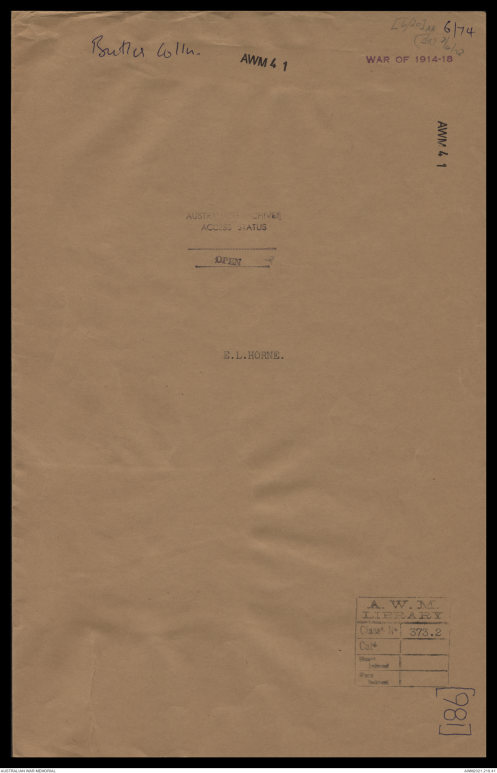
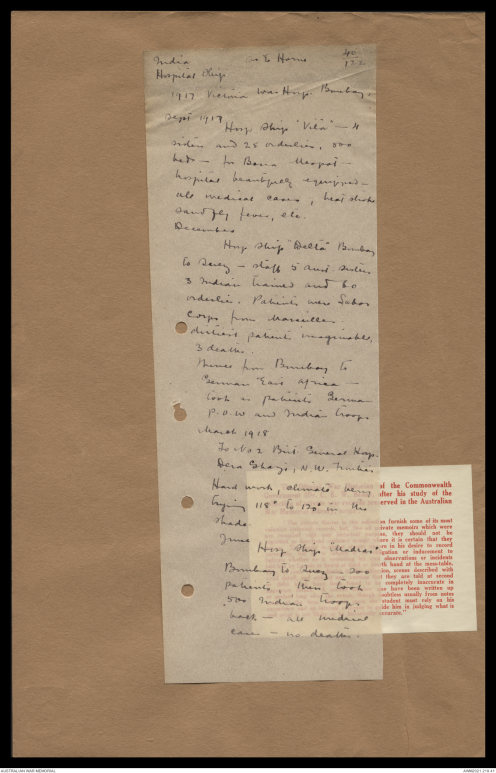
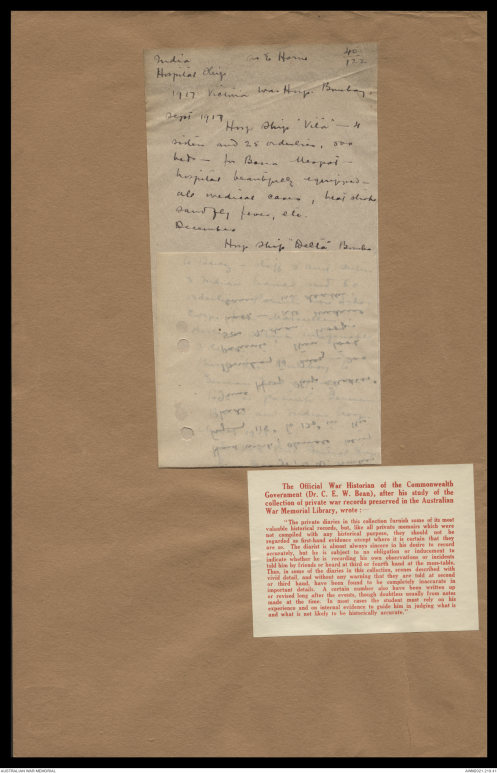
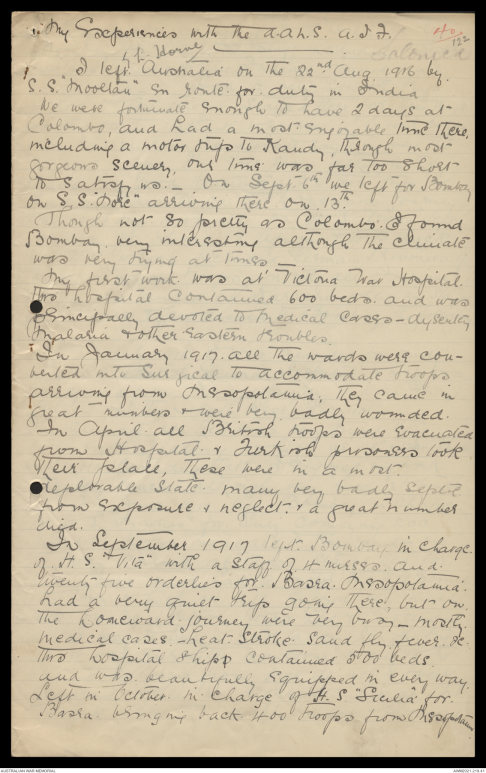
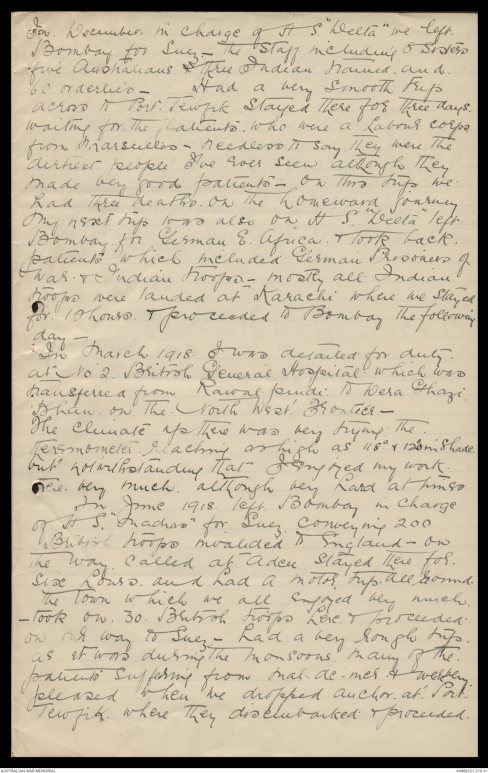
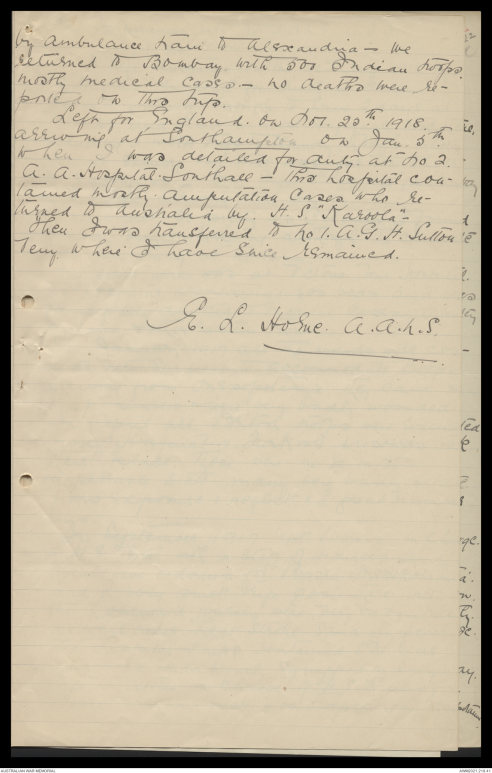
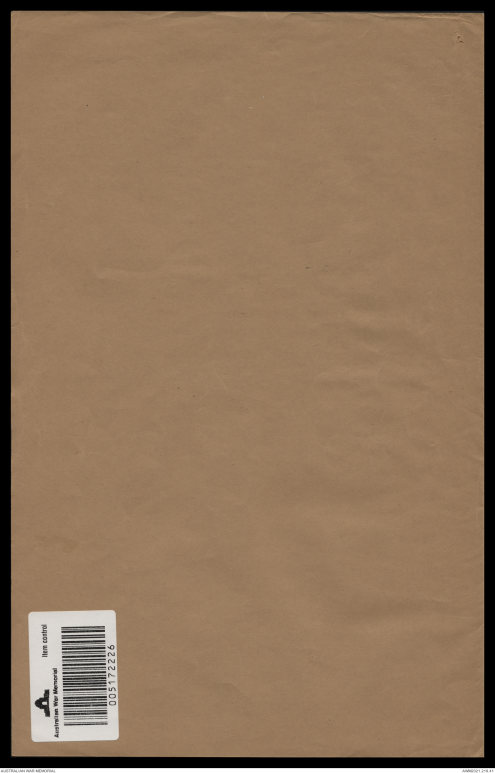
Butler Colln.
AWM 41
WAR OF 1914-18 6/74
AUSTRALIAN ARCHIVES
ACCESS STATUS
OPEN
E.L.HORNE.
[*A.W.M. LIBRARY
Classifn No 373.2
[981]*]
India
As to Home
40/122
Hospital Ship
1917 Victoria War Hosp. Bombay.
Sept 1917
Hosp Ship “Vila” — 4
sisters and 25 orderlies, 500
beds - for Basra Mespot-
hospital beautifully equipped -
all medical cases, heat stroke,
sandfly fever, etc.
December
Hosp ship "Delta" Bombay
to Suez - staff 5 Aust sisters
3 Indian trained and 60
orderlies. Patients were Sabor
Corps from Marseilles.
dirtiest patients imaginable,
3 deaths.
Nurses from Bombay to
German East Africa -
took in patients German
P.O.W. and Indian troops
March 1918
To No 2 Brit General Hospital.
Dera Ghazi, N.W. Frontier
Hard work, climate very
trying 1180 to 1200 in the
shade.
June
Hosp ship "Madras"
Bombay to Suez - 200
patients, then took
500 Indian troops
back - all medical
cases - no deaths.
India
As to Home
40/122
Hospital Ship
1917 Viaimia War Hosp. Bombay
Sept. 1917
Hosp Ship 'Vila" -4
sisters and 25 orderlies, 500
head - for Bassa Mespot
hospital beautifully equipped-
all medical case, heat stroke
sandfly fever, etc.
Hosp Ship "Delta" bombed
[*The Official War Historian of the Commonwealth
Government (Dr. C. E.W. Bean), after his study of the
collection of private war records preserved in the Australian
War Memorial Library, wrote:
"The private diaries in this collection furnish some of its most
valuable historical records but, like all private memoirs which were
not recorded with any historical purpose, they should not be
regarded as first-hand evidence except where it is certain that they
are so. The diarist is almost always sincere in his desire to record
accurately but he is subject to no obligation or inducement to
indicate whether he is recording his own observation or incidents
told him by his friends or heard at third or fourth hand at the mess-table.
Then, in some of the diaries in this collection, scenes described with
vivid detail, and without any warning that they are told at second
or third hand, have been found to be completely inaccurate in
important details. A certain number also have been written up
or revised long after the events, though doubtless usually from notes
made at the time. In most cases the student must rely on his
experience and no internal evidence to guide him in judging what is
and what is not likely to be historically accurate."*]
My Experiences with the A.A.L.S. A I.F.
40/122
E L. Horne
Salonica
I left Australia on the 22nd Aug 1916 by
S.S. "Mooltan" en route for duty in India
We were fortunate enough to have 2 days at
Colombo, and had a most enjoyable time there,
including a motor trip to Kandy, through most
gorgeous scenery. Our time was far too short
to satisfy us. - On Sept 6th we left for Bombay
on S.S. "Fore" arriving there on 13th.
Though not so pretty as Colombo I found
Bombay very interesting although the climate
was very trying at times.
My first work was at Victoria War Hospital.
The Hospital contained 600 beds and was
principally devoted to Medical cases - dysentery
Malaria & other Eastern troubles.
In January 1917 all the wards were converted
into surgical to accommodate troops
arriving from Mesopotamia. They came in
great numbers & were very badly wounded.
In April all British troops were evacuated
from Hospital & Turkish prisoners took
their place, These were in the most
deplorable state. Many very badly septic
from exposure & neglect a great number
died.
In September 1917 left Bombay in charge
of H.S. "Vila' with a staff of 4 nurses and
twenty five orderlies for Basra Mesopotamia.
had a very quiet trip going there but on
the homeward journey were very busy - mostly
medical cases - heat stroke sand fly fever &c.
This hospital ships contained 500 beds
and was beautifully equipped in every way.
Left in October in charge of H.S. "Sicilia" for
Basra bringing back 400 troops from Mesopotamia
In December in charge of H S "Delta" we left
Bombay for Suez - the staff including 8 sisters
five Australians & three Indian trained and
60 orderlies - had a very smooth trip
across to Port Tewfik stayed there for three days.
waiting for the patients who were a Labour corps
from Marseilles - Needless to say they were the
dirtiest people I've ever seen although they
made very good patients - on this trip we
had three deaths on the homeward journey
My next trip was also on the H S "Delta" left
Bombay for German E. Africa & took back
patients which included German Prisoners of
War & Indian troops - mostly all Indian
troop were landed at Karachi where we stayed
for 12 hours & proceeded to Bombay the following
day -
In March 1918 I was detailed for duty
at No. 2 British General Hospital which was
transferred from Rawalpindi to Dera Ghazi
Khan on the North West Frontier -
The climate up there was very trying. The
thermometer reaching as high as 1180 &1200 in shade
but notwithstanding that I enjoyed my work
there very much although very hard at times.
In June 1918 left Bombay in charge
of H S. "Madras" for Suez conveying 200
British troops invalided to England -on
the way called at Aden stayed there for
six hours and had a motor trip all round
the town which we all enjoyed very much.
-took on 30 British troops here & proceeded
on our way to Suez - had a very rough trip.
as it was during the monsoons. Many of the
patients suffering from mal de-mer & were very
pleased when we dropped anchor at Port
Tewfik where they disembarked & proceeded
by ambulance train to Alexandria - we
returned to Bombay with 500 Indian troops
mostly medical cases - no deaths were reported
on this trip.
Left for England on Nov. 20th 1918.
arriving at Southampton on Jan 5th
when I was detailed for duty at No 2.
A.A. Hospital Southall - this hospital contained
mostly Amputation cases who returned
to Australia by H.S "Karoola" -
Then I was transferred to No 1. A.G.H. Sutton
Terry where I have since remained.
E.L. Horne A.A.L.S.
 Sam scott
Sam scottThis transcription item is now locked to you for editing. To release the lock either Save your changes or Cancel.
This lock will be automatically released after 60 minutes of inactivity.